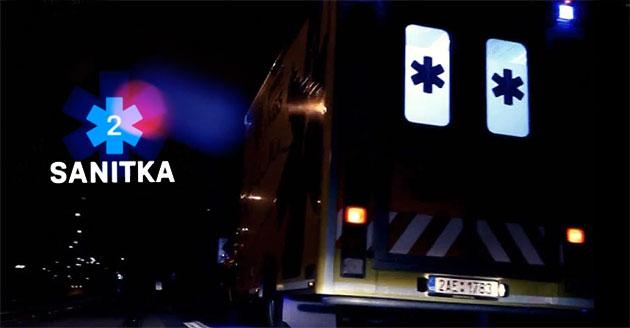Open letter to the writers of the Czech television serial "Sanitka 2"

Mr Hubač, Mr Renč,
I have decided to write you an open letter in response to your "Sanitka 2" project. I was pushed to do this by episode number 8, which was broadcast on 25 October.
That episode continues the plot line from the previous one, in which the husband of a blind woman takes revenge on two Romani men. His wife died as a result of the Romani men committing a robbery.
Once again we are seeing the simplified notion of a Romani man as a creature predestined to commit crime. Whenever a Romani man shows up in this serial, he is either stealing something or cutting his female partner’s throat (as in episode number 2).
Of course, along with the hero we enter the building in which the thieves live together with a whole Romani horde (what else should we call the community you portray here?). These scenes give us an even better insight into the perspective on the Romani minority taken by this serial, and it is a dangerous, misleading and reactionary one.
During the act of revenge, an older Romani man gets involved who performs the function of some sort of local vajda, a leader with natural authority. During his intervention, we learn that the Roma have a rule telling them "not to rob the blind".
Even though their apartment is full of stolen wallets, they must still honor this rule while making a living as criminals. So when the vajda finds the blind woman’s mobile phone amongst all the other stolen mobile phones as proof, he decides to punish the guys responsible himself.
The whole group assembles around a blazing campfire, the guys take off their brand-name clothing, and the vajda picks up a whip. He starts whipping the guys, who are naked to the waist, and the shots of flames whipping about, backs covered with blood, and the husband’s face are interspersed with shots of his wife, in whose memory this justice is being done.
After the beating, the Romani leader turns to the blind woman’s husband and says of the bleeding youths who are crawling around the campfire: "They won’t do it again."
Apart from the unrealistically dressed figures absurdly declaiming in the "gypsy baron" style, the main problem here is the completely unrealistic view of the Romani way of life. I have experience with Romani communities in excluded localities (Přednádraží Street in Ostrava, Ústí nad Labem), and that is why your portrayal is all the more unbelievable, unenlightened and also (and I consider this to be the biggest problem) angry, jaundiced, full of fear of these people who give the impression of being a bloodthirsty, weird, wild minority. If they do have a sense of justice, then it is a bloody justice, performed in a barbaric way.
I think every filmmaker is responsible for the ideological and moral corpus of his works. Every filmmaker is responsible for the ethics and the intellectual methods communicated by his film.
I am unable to grasp why filmmakers are creating media images that represent the Romani minority – even at the cost of outright falsification – as a dangerous, foreign, and incomprehensible group of people. These images are comprised of generalizations, of invented peculiarities, and of prejudices that in the best-case scenario warn the viewer away from us Roma, shutting us behind a curtain of terrifying rumors and tales. In the worst-case scenario, they stir up aggressive paranoia and bitterness about us.
Given the extensive marketing of this serial and its prime-time slot on Friday evenings, it is important to remind you of your responsibility as filmmakers. Right now, when "liquid anger" is spreading through European society just waiting for a scapegoat to blame for its general frustrations, and when the citizenry are radicalizing and joining the extreme right in its fight against the Romani minority, your project is yet another dangerous dose of fuel to the fire of flagrant misunderstanding.
You cannot portray a complicated time in a simple way, and your enterprise contributes nothing to the discussion. It is not a stimulating opinion, it just spreads anger and fear without trying to point out any connections to the larger social context. Therefore, I call on you to explain this civic and professional error.
When D. W. Griffith made the film "Birth of a Nation" depicting members of the Ku-Klux-Klan as heroes and black people as violent animals, he later felt the need to correct that mistake and made his magnum opus, "Intolerance", about the need for tolerance, understanding, and an effort to reconcile differences. What will you do?
Sincerely,
Lukáš Senft, documentary filmmaker
First published in Czech on the author’s blog.